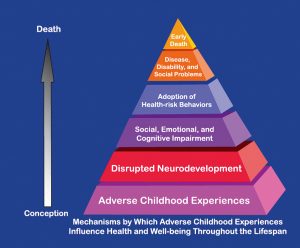The emotional trauma that children experience doesn’t necessarily end when a tough time is over. Its consequences can easily last a lifetime. That’s what neuroscience has been telling us for the past two decades. If we are willing, as a society, to come to terms with this knowledge, then we will be able to solve many challenges that currently face our world.
We can also make a difference to our individual lives. Once we become curious about the emotional traumas we faced as a child, we gain insights as to the source of emotional struggles we have carried our whole life as an adult. There is now a massive amount of evidence showing that adult health problems, mental health struggles, behavioural challenges and relationship difficulties have their origins in childhood stress.
 Why does early trauma leave a lasting impact?
Why does early trauma leave a lasting impact?
Babies are born with immature brains. Human brains are designed by evolution to develop after birth, with the most rapid period of growth occurring between conception and 3 years of age. Roughly 1000 neural connections are formed every second during these early years. That is an astounding rate. Those connections are shaped not simply by genetics but by the baby’s experiences of the world.
One of the key things that brains are ‘trying’ to figure out is whether the world feels safe or scary. The brain then grows neural connections designed to cope with this knowledge about the world. A baby’s brain doesn’t realise things could be different. A baby’s brain believes that the particular, personalized, daily world that a baby has been born into is the world. The baby’s brain molds itself to that reality. A baby’s physiology is designed to adapt so that the baby can survive in the world he or she is born into.
Trauma is a form of physiological stress. The brain and body has been subjected to fear. We know that trauma can alter adult brains. That’s the basis of the diagnosis called Post-Traumatic Stress Disorder (PTSD). A person with PTSD has experienced stress so severe that it has altered the way the brain and body function. PTSD can result even from a single event. If fully mature adult brains can be so significantly affected by trauma, imagine the impact of stress on the vulnerable, immature brains of babies.
 How do we know that the consequences of early trauma can last a lifetime?
How do we know that the consequences of early trauma can last a lifetime?
In 1989, a research paper was published that has come to be known as the Adverse Childhood Experiences Study. Its findings showed that violence, neglect, parental mental illness and even parental divorce during childhood leave physiological consequences. Too much of these kinds of stressors cause neurological impairments that result in adult health problems like heart disease, diabetes, substance use and suicide.
The Adverse Childhood Experiences Study has had a dramatic impact on the way that many people now think about childhood stress. It has led to a raft of follow-up studies, and changes in public health policies in many regions of the world. There is greater appreciation of why violence, poverty and mental illness can be passed down through the generations of a family or a community.
Emotions live in our bodies
 One of the core things that this study teaches us is that emotions are physiological processes. Emotions live in our bodies. Sometimes it can seem that emotions live only in our minds and that they are fleeting. They seem ephemeral. Once we have stopped feeling an emotion, it simply evaporates.
One of the core things that this study teaches us is that emotions are physiological processes. Emotions live in our bodies. Sometimes it can seem that emotions live only in our minds and that they are fleeting. They seem ephemeral. Once we have stopped feeling an emotion, it simply evaporates.
This study reminds us that is not true. The emotions we feel leave physiological traces. If we experience an emotion often enough – whether it be joy, excitement, sadness, fear, anger, disgust, disappointment — it changes the way our body functions. Stress and fear can literally debilitate us.
That’s why it makes sense for us to give much more thought to the emotional experiences our babies have. Babies’ worlds are created on a daily basis by parents, caregivers, product manufacturers and policymakers. While ‘emotional trauma’ may lead us to think first of extreme experiences, we quickly come to realise that the study of trauma also helps us to think about babies’ everyday experiences.
Ordinary, fleeting moments matter to babies – and probably much more than we adults ever imagine.
This video gives some insights into the consequences of early emotional trauma:
[huge_it_videogallery id=”8″]
